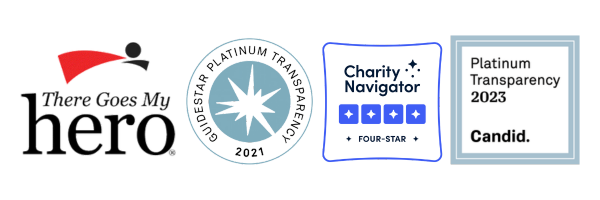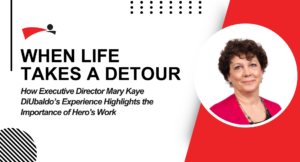When Life Takes a Detour
When Life Takes a Detour
How Executive Director Mary Kaye DiUbaldo’s Experience Highlights the Importance of Hero’s Work
When my husband and I decided to go away for a couple of days to the Amish country, I was looking forward to some relaxation and fun. Going to the Amish Market, my favorite pickle store downtown, and experiencing all Lancaster has to offer were the only things on my agenda. Little did I know that this trip would result in an unexpected crazy week that would further my appreciation of what we do at There Goes My Hero.
As my husband and I were leaving the hotel through the stairwell to go on our Amish adventure, he missed a step and fell, resulting in the rupture of his quadriceps in both legs. He was taken to Lancaster General Hospital where he was admitted, and after a couple of days of tests, underwent surgery. Our 2 day get away resulted in a one week stay in an unfamiliar town where I did not know a soul.
While my husband was receiving excellent care without a worry in the world except getting better, my mind was working overtime. I had to think about other things, such as extending the hotel stay on a daily basis or finding a different hotel, looking for a laundromat, buying more clothes and incidentals, figuring out where to eat, shopping for snacks, and purchasing a myriad of hospital equipment for our return to our home. Never mind the car issues I started to have and my search for a mechanic in an unfamiliar place. I was alone in a strange place and at times, I was completely overwhelmed. While people in Lancaster and in Baltimore offered support, there was not much they could do to help me with my day-to-day decisions and choices.
So what does this story have to do with There Goes My Hero? Everything.
The first day of the accident, I was at the hospital from 11:00am to 8:00pm. I spent all my time on the phone with family and friends, the insurance company, and the normal hurry up and wait, trying to see doctors, be taken to a permanent room, etc. I realized at the end of the day I had not eaten anything. When I got back to my hotel room around 8:30pm, I grabbed dinner at an expensive restaurant in the hotel. And while it was delicious, it was not a sustainable plan for dinner each night.
I had not thought about the practicalities of staying extra days in Lancaster, a place that I was not familiar with. It was during my time there, having to eat out every day, learning my way around, paying for the unanticipated costs of treatment, like additional hotel days, food, medical supplies, and transportation that I reflected on what we give our patients and their caregivers through the Hero Fund and the Meals for Heroes program.
I thought about how financially I could afford this emergency when many of those we serve cannot. I considered that I was only a couple of hours away from home and staying in a small town like Lancaster, whereas many of our patients are traveling from hundreds of miles away and are from small towns coming to a big city like Baltimore for the first time. Not knowing where there is a grocery store or a hotel or but feeling ill equipped to venture out on their own. Lacking familiarity with their surroundings and having to make life and death decisions while worrying about the mundane such as where they are staying that evening or where they are going to eat and how they are going to pay for it. And I thought about the Hero Fund and how it is in place for that exact reason. When emergencies occur on top of your blood cancer diagnosis and how you don’t know how you are going to pay for it.
I am very blessed that I could afford the extra days at the hotel and the extra meals, and from time to time, a glass of wine. I didn’t worry about paying for parking, the extra meals, lodging and the other expenses while my husband was in the hospital. I was incredibly grateful that my husband’s hospital stay only lasted one week. I didn’t need to be worried about mounting bills that occur due to long stays and unemployment, which is among the challenges that occur with a blood cancer diagnosis.
These worries are very real realities for some of the blood cancer patients we serve through the Hero Fund distributed by Johns Hopkins and University of Maryland Medical Center. The Hero Fund pays for the unexpected costs of treatment such parking, meals, transportation, and lodging.
I would have loved to have someone prepare me a home cooked meal like we prepare for the patients and caregivers at the Johns Hopkins Hackerman Patz Patient and Family Pavilion. Would I like to have a comfort bag or a card of encouragement and a friendly person to talk to when I was overwhelmed? Absolutely. And this is exactly what There Goes My Hero corporate and community volunteers provide. These volunteers come together to prepare and serve meals once a month at the Hackerman Patz Patient and Family Pavilion. They make homemade cards of encouragement and sometimes hand out comfort bags that other volunteers put together.
Our volunteers and staff who serve every month see that it is the little things that mean so much. A warm meal with a homemade card served by a friendly face can bring more peace than you can know. A comfort bag filled with drinks, snacks, and fuzzy socks can be so important in that moment.
Sometimes we have no idea what someone is going through, and the difficulties of a blood cancer diagnosis can affect how you feel moment to moment. My husband’s injuries were severe but straight forward. No stairs, medication, home health physical therapy, and lots of follow up appointments. The good news was he had a short trajectory of care unlike some of the patients we work with. Blood Cancer is an on-going process that can take a couple of years of treatment and appointments to reach good health.
During this season of giving, I am grateful for our donors, volunteers, partners, board members, and staff who make Hero a place that provides comfort in so many ways. While I always knew it, feeling it at a personal level makes me appreciate everyone who makes an impact on the lives of those we serve, even more.

